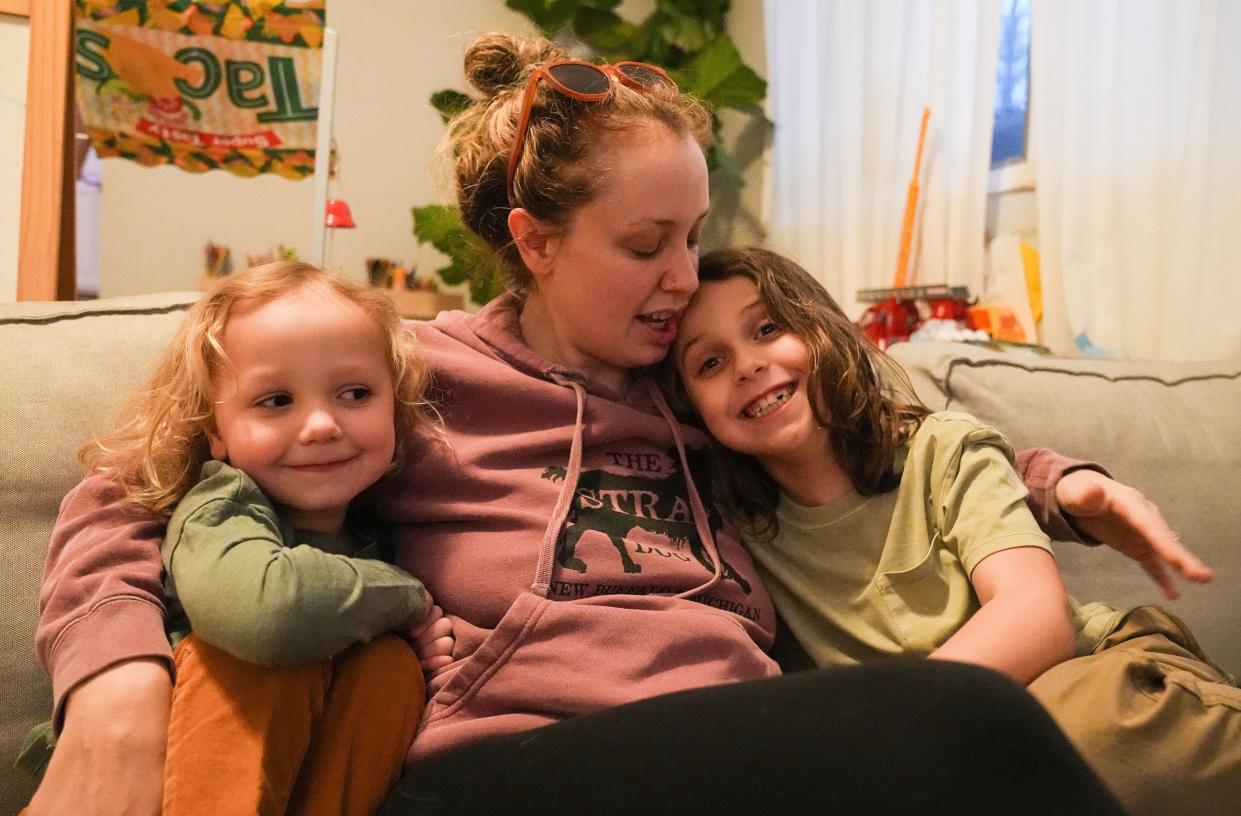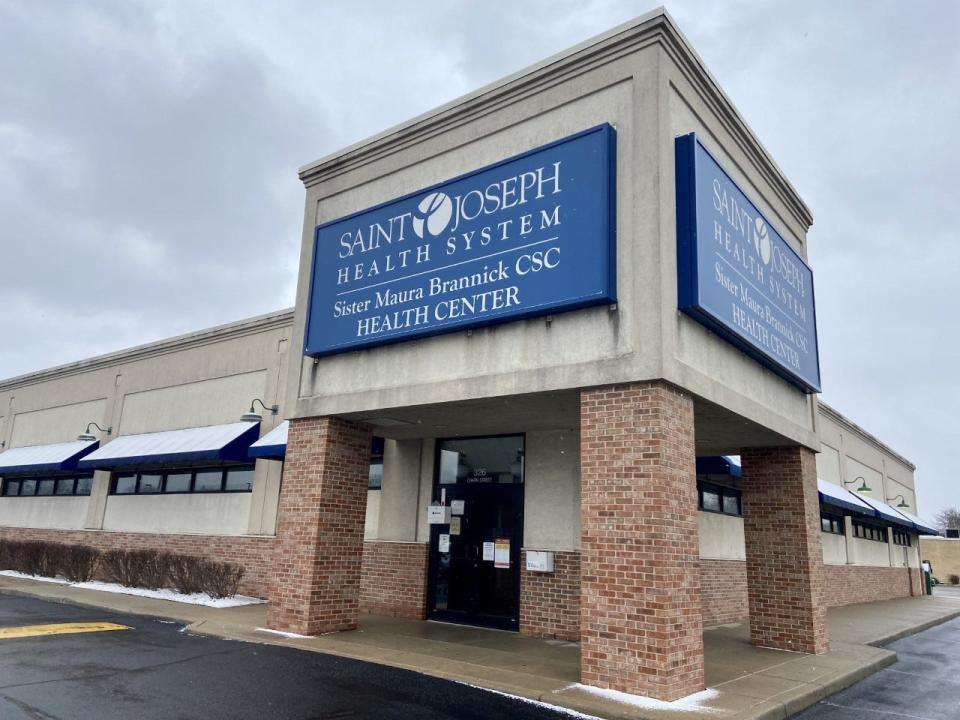'Three years of kids getting sick all at once': High demand has medicines on short supply

With an uptick in illnesses this winter, some pharmacy shelves in Indiana may be looking thin in common medicines used to break fevers and keep flu symptoms at bay.
Blair Gingerich, a pharmacist with the Saint Joseph Health System's Sister Maura Brannick Health Center in South Bend, said she has noticed a change in availability of some prescription and over-the-counter drugs, but she's also encouraging families not to panic.
"We all saw what happened during the start of the pandemic when people started buying all the toilet paper," Gingerich said. "Toilet paper doesn't have an expiration date, but medications do. ... Just purchasing the amounts people needs is very appropriate in this time."
Medication shortage:What to do if the pharmacy is out of your sick child's antibiotic or other medicine
But for some families, just finding the recommended amount needed to help make an illness more comfortable has become difficult.
When a doctor diagnosed Ethan McCardle with his first ear infection earlier this month, his parents went to a central Indiana Walgreens right away to fill a prescription for antibiotics. The only thing that Ethan’s mother Katie Swaney got from the drugstore that Friday, though, was a text telling her the pharmacy was out of the antibiotic and her prescription would be ready Saturday afternoon. On Saturday a similar text arrived, followed by another on Sunday.
By Monday, as Ethan’s fever of 103 and pain continued, Swaney and her husband started calling pharmacies near their Carmel, Ind., home to locate amoxicillin. After hours on the phone, they found the drug at a northside Meijer and were finally able to treat Ethan. Within 24 hours, the second-grader felt much better and was fever-free.
Across Indiana, parents with sick children have been searching for the medicines they need to ease hacking coughs and feverish chills. While amoxicillin has been in short supply since the fall, parents are also struggling to find liquid Tylenol or ibuprofen for children fighting the flu, COVID-19 or a host of other circulating viruses.
“I know so many people that are sick right now that have kids that need medicine that aren’t able to find it and are jumping through hoops just to get comfort care,” Swaney said.
Patients have been flooding pediatrician offices as a so-called tripledemic of RSV (respiratory syncytial virus), COVID-19 and early flu season hits. As of the first week in December, Indiana had seen 24 deaths from flu and its first pediatric flu death, according to the Indiana Department of Health. Last year at this time, Indiana had reported only one influenza death.

'A flood of patients':Respiratory illnesses fill children's hospitals
The state’s hospitals are also seeing more patients than they did last year at this time when the COVID-19 Omicron wave started to swell, according to the Indiana Hospital Association. As of earlier this week, inpatient volume had jumped 15% with more than 11,000 hospitalized people across the state, association officials said in an news release.
Last month the American Academy of Pediatrics and the Children’s Hospital Association asked the federal government to declare the surge in pediatric illnesses a national public health emergency.
Fortunately, most of the children falling ill with these diseases do not require hospitalization. But outpatient pediatricians have been hearing from more concerned parents in a year that’s shaping up to be busier than in a typical pre-pandemic year.
Over the past two winters, COVID concerns led people to social distance and mask when in groups or in school, decreasing the spread of multiple respiratory diseases. This year many have stopped those behaviors, allowing some viruses to flourish and parents to head to pharmacies for drugs to combat those germs. And in the wake of viral infections, some children will go on to develop bacterial infections that require antibiotics.
“It’s not that people are getting sicker than they normally would. It’s just that it’s three years of kids getting sick all at once,” said Dr. Shannon Dillon, a pediatrician with Riley Primary Care. “There aren’t supply chain issues. It’s just because there are so many more sick kids than there would be normally at this time of year.”
Since Thanksgiving, Dr. Sarah Stelzner has seen far more children in her Marion County practice ill with flu than with COVID-19, most of whom have not had their flu shots. A past president of the Indiana chapter of the American Academy of Pediatrics, Stelzner said she’s heard of local schools where about 40% of students are absent due to illness.
Demand for children's medications outpaces supply
Drug shortages are not necessarily uncommon — right now there are about 260 medications in limited supply — but most of those drugs tend to be medications used in hospitals, said Erin Fox, senior senior director of the University of Utah Health’s Drug Information Service, which tracks drug shortages.
Usually drug shortages stem from problems with manufacturing but this time appears to be different, said Veronica Vernon, an assistant professor of pharmacy practice at Butler University College of Pharmacy and Health Sciences.
While the lack of liquid children’s Tylenol is not officially a shortage, Vernon said, she knows firsthand how difficult it can be to find it. When her 2-year-old had croup recently, her husband stopped by a local pharmacy to buy acetaminophen. He got the last bottle.
More:As flu activity rises, Marion County hospitals implement visitor restrictions
“Demand is outpacing the supply. … This really is demand-based which is very interesting,’ she said. “It’s really just that we can’t keep things on the shelves.”
Each year drug manufacturers calculate how much of the supply to make based on how much they sold the previous year, Fox said. Because no one predicted that this winter would see so many people fall ill, the drug companies did not correctly gauge how much medicine to make.
"I've been a pharmacist for 12 years now, and this isn't the first time we've had shortages on medications and it will certainly not be the last time on a national level," Gingerich said. "What I would love for people to understand is that there are alternatives a lot of times to maybe the first medicine a person would reach for."
How parents are coping with the medicine shortage
Without a free-flowing supply of the medicines on which they rely to keep sick children comfortable and heal, parents and pharmacists have had to get creative.
Gingerich recommends consulting with a pharmacist or other local health care provider for their guidance on navigating alternatives.
"With medications, there are side effects and there are reasons to select one over the other and your pharmacist is going to be your best resource for navigating those concerns," she said. "There's no one size fits all in the world of medications."
Even before other parents started talking about a children’s liquid Tylenol shortage, Kate Onuška noticed the empty medicine shelves. Her 7-year-old daughter has asthma, so Onuška likes to get ahead of any cold she develops, treating her with Tylenol and albuterol lest the cold lead to more serious health problems.
About a month and a half ago, though, when she added liquid Tylenol to her curbside grocery order, it kept coming up unavailable. She started hunting in person, but still no luck.
“I thought I was just going to all the wrong places at all the wrong times,” Onuška said. “Then I saw there was a shortage and gave up.”
Instead of the liquid medicine, Onuška purchased chewables, which she does not feel work as effectively for her daughter. Still, she said, she feels fortunate that her daughter can take the chewables. She can’t imagine how parents with younger children or teething infants are navigating the shortage.
No antibiotics were available last month when Kristi Howard-Shultz’s 9-year-old, Henry, was diagnosed with strep throat. Her local pharmacist in Bloomington, Ind., called around to other drugstores but no one had the medicine in stock.
For the next seven days, Henry subsisted on popsicles and ran a fever consistently above 103. Each day Howard-Shultz called the pharmacy and asked the pharmacist if he had found antibiotics. Eventually, close to tears, Howard-Shultz said, she was concerned her son might develop kidney failure from the high fever.
The pharmacist called drug stores in other counties and on day seven, he had rustled up three tiny bottles from pharmacies in Monroe, Bartholomew and Brown Counties, enough to fill the prescription. Twelve hours after the first dose, Henry's fever finally broke.
“After all these years of the pandemic, you really take for granted, that is a first-world problem, never did I think we would not be able to get ahold of typical antibiotics,” Howard-Shultz said.
Many of these companies have told the Food and Drug Administration they will increase production so the shortages will hopefully ease in the coming months.
In the meantime, there are two things you can do to help prevent finding yourself in need of medicine in the first place, experts say: Get your annual flu shot and make sure you are up to date with your COVID vaccinations. Both of these vaccines can prevent severe illness and stave off the virus.
Gingerich recommends families make an effort to plan ahead in case someone does fall ill. It may be appropriate to keep one bottle of medicine available at home to avoid encountering shortages later on when that medicine is most needed. She also advises that families be comfortable rescheduling plans this holiday season if is sick.
South Bend Tribune reporter Carley Lanich contributed to this story.
Contact IndyStar reporter Shari Rudavsky at shari.rudavsky@indystar.com.
This article originally appeared on Indianapolis Star: 'Three years of kids getting sick all at once' has medicines scarce

